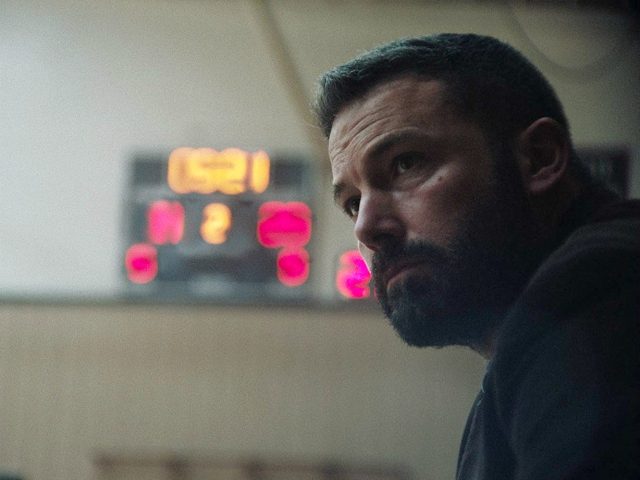Every time you underestimate Ben Affleck, he makes a fool of you. First as a top-shelf director, including Best Picture winner Argo; and now, in director Gavin O’Connor’s The Way Back, as a movie star and actor capable of enormous depth.
Affleck’s turn as Jack Cunningham, a weary, bloated, mid-40s alcoholic construction worker, is by far his most impressive piece of work as an actor. In fact, any actor would be proud of this performance. Affleck’s quiet presence works like gangbusters, because despite all that quiet, it’s still there — the rage, the pain, the disappointment in himself, the self-pity and self-loathing.
Acting’s in the eyes — not the foreign accent, not the hoo-rah, not the flash and fury. It’s in the windows to the soul, and even while wearing sunglasses, even when he’s perfectly quiet and still, your heart breaks for the guy. That’s the power of a movie star who’s developed the skill to plumb the depths of his persona.
And then there’s the moment Jack’s asked to coach a high school basketball team, and what Affleck does with that moment, with that instant — Jack’s surprise mixed with the part of him that says he doesn’t deserve this… It’s a knockout performance.
By day, Jack stumbles through the soul-deadening routine of a barely functioning alcoholic. A beer in the shower and cheap vodka disguised in a coffee cup at work.
At night he drinks himself silly at a local dive, the kind of place so depressing it fools a drunk into believing this is all normal.
A shot at redemption arrives, as it always does in these kinds of movies, in the form of that out-of-the-opportunity. Jack’s offered the title of head basketball coach at his high school alma mater, where he’s something of a legend.
Naturally, the team stinks and is populated with clichés: the ladies man, the quiet one with all the talent and trouble at home, the fat clown, the one with all the swagger who’s really hiding his own insecurities.
Naturally, Jack discovers there’s some real talent in these Bad News Catholic Boys, and comes alive again as he whips them into shape.
Meanwhile, we wait in agony for the alcoholism to blow it all up.
The first 90 minutes are terrific, even though it’s a bit much in places. You see, there’s a reason Jack fell apart; about an hour in, we learn he’s hoping to drink his way through a terrible tragedy. While my goal is to always accept a movie on its own terms, I couldn’t help thinking the story would have been better served without that melodrama. Most people struggling with addictions — well, the reasons are just not that … poetic.
In a lot of cases, addicts suddenly find themselves trapped when the partying catches up to them. That would have been a more interesting dilemma, or at least something unique. Until this reveal, the story’s verisimilitude was one of its primary virtues. Affleck looks like a jock who let himself go and everything about his workaday life in San Pedro, from his vehicle to his clothes to the location shooting to the family estrangement, felt achingly real.
The Way Back really lost me just when it should have been sealing the deal — in those final moments.
Throughout, a bunch of thematic pipe is laid down about how this religious school expects Jack to guide his team into becoming better men. Jack’s habit of swearing on the court, especially when he doesn’t like a call, is at first played for laughs. He keeps apologizing to the team’s chaplain, who’s already managed to explain the school’s code of conduct without sounding pious.
This idea actually deepens when the swearing stops being funny, when we realize it’s a manifestation of what really unspooled Jack — his uncontrolled rage at the injustice of his tragedy. And that’s great. I love when a movie does an emotional head fake, when it tells you, You shouldn’t be laughing.
But in the movie’s final moment, this is again played for laughs, and that’s as charitable of an interpretation as I can come up with. You could also interpret it as a total rejection of the grace of Christianity, a “screw you” to those of us who were led to believe the location of a Catholic school and the idea of developing boys into “men of integrity and faith” would mean something.
In the end, other being skilled and more confident basketball players, Jack taught these boys nothing.
What’s more, the always underrated T.K. Carter plays a father to one of the players, and his one big scene again seems to work this theme. “I don’t want my son investing his future in the game of basketball,” he tells Jack (in so many words). So here we are, once again being told this movie’s going to be about something more, only to either have the idea dropped completely or rubbed in our faces.
There’s a lot to recommend here, and I might give The Way Back a second chance. Maybe I missed something, maybe there was something building up to those final moments. I don’t know. All I do know is that I need to see Hoosiers (1986) again, and as soon as possible.
Follow John Nolte on Twitter @NolteNC. Follow his Facebook Page here.

COMMENTS
Please let us know if you're having issues with commenting.